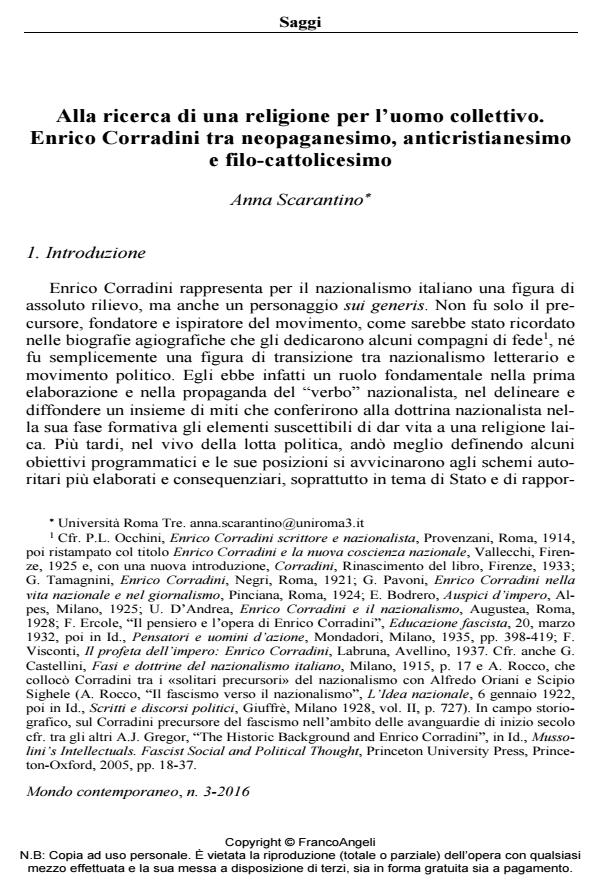In Search of a Religion for the Collective Man. Enrico Corradini between Neo-Paganism, Anti-Christianity and Filo-Catholicism
Journal title MONDO CONTEMPORANEO
Author/s Anna Scarantino
Publishing Year 2017 Issue 2016/3 Language Italian
Pages 47 P. 5-51 File size 410 KB
DOI 10.3280/MON2016-003001
DOI is like a bar code for intellectual property: to have more infomation
click here
Below, you can see the article first page
If you want to buy this article in PDF format, you can do it, following the instructions to buy download credits

FrancoAngeli is member of Publishers International Linking Association, Inc (PILA), a not-for-profit association which run the CrossRef service enabling links to and from online scholarly content.
What was the position of Italian imperialist nationalism towards religion and the religious dimension of politics, as it manifested itself in the first decades of the 20th century facing the rise of the masses? How was it possible to conciliate the cult of the Nation, a cult which became a religious one, with the defense of the tra-ditional religion of the Italians and with the nationalists’ will to seal a durable agreement with the Catholics? Is it possible to establish a link between these two dimensions? This is what this essay aims to investigate through an analysis of the positions of the acknowledged founder of the movement, Enrico Corradini. His evolution between literature and politics was characterized by a long anti-Christian and pagan season, where paganism represented the model of the attained fusion between national conscience and religious faith, and Christianity was the disrup-tive element that had broken the ancient balance and the continuing obstacle to the development of a strong national faith in the present. Separating and confront-ing Christianity to Catholicism, he resumed the latter as heir to the universal great-ness of Rome and tried to absorb it within the religion of the Nation. Corradini’s thought, at once authoritarian, mythic, pseudo-religious and modernist, appears therefore paradigmatic of a current of thought that was discovering the im-portance of the religious dimension of politics even before the Great War, repre-senting at the beginning of the century the first breeding ground of Fascism.
Keywords: Enrico Corradini, anti-Christianity, Nationalism and religion, paganism and Nationalism, romanità (romaness) and Nationalism, Catholicism and Natio-nalism
Anna Scarantino, Alla ricerca di una religione per l’uomo collettivo. Enrico Corradini tra neopaganesimo, anticristianesimo e filo-cattolicesimo in "MONDO CONTEMPORANEO" 3/2016, pp 5-51, DOI: 10.3280/MON2016-003001